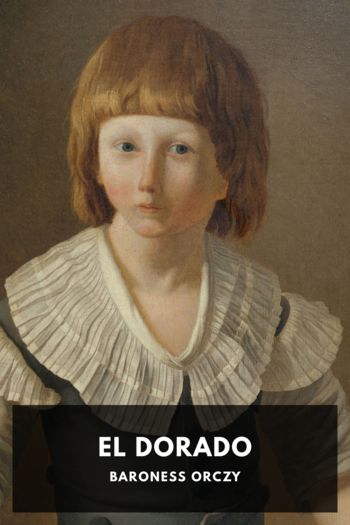El Dorado, Baroness Orczy [read the beginning after the end novel .TXT] 📗

- Author: Baroness Orczy
Book online «El Dorado, Baroness Orczy [read the beginning after the end novel .TXT] 📗». Author Baroness Orczy
His restless eyes peered with eager interrogation into those of the younger man. He paused as if waiting for a reply; then, as St. Just remained silent, he reiterated slowly, almost in the tones of a challenge:
“If indeed he hates this bloodthirsty revolution of ours as he seems to do.”
The reiteration implied a doubt. In a moment St. Just’s loyalty was up in arms.
“The Scarlet Pimpernel,” he said, “cares naught for your political aims. The work of mercy that he does, he does for justice and for humanity.”
“And for sport,” said de Batz with a sneer, “so I’ve been told.”
“He is English,” assented St. Just, “and as such will never own to sentiment. Whatever be the motive, look at the result!
“Yes! a few lives stolen from the guillotine.”
“Women and children—innocent victims—would have perished but for his devotion.”
“The more innocent they were, the more helpless, the more pitiable, the louder would their blood have cried for reprisals against the wild beasts who sent them to their death.”
St. Just made no reply. It was obviously useless to attempt to argue with this man, whose political aims were as far apart from those of the Scarlet Pimpernel as was the North Pole from the South.
“If any of you have influence over that hotheaded leader of yours,” continued de Batz, unabashed by the silence of his friend, “I wish to God you would exert it now.”
“In what way?” queried St. Just, smiling in spite of himself at the thought of his or anyone else’s control over Blakeney and his plans.
It was de Batz’ turn to be silent. He paused for a moment or two, then he asked abruptly:
“Your Scarlet Pimpernel is in Paris now, is he not?”
“I cannot tell you,” replied Armand.
“Bah! there is no necessity to fence with me, my friend. The moment I set eyes on you this afternoon I knew that you had not come to Paris alone.”
“You are mistaken, my good de Batz,” rejoined the young man earnestly; “I came to Paris alone.”
“Clever parrying, on my word—but wholly wasted on my unbelieving ears. Did I not note at once that you did not seem overpleased today when I accosted you?”
“Again you are mistaken. I was very pleased to meet you, for I had felt singularly lonely all day, and was glad to shake a friend by the hand. What you took for displeasure was only surprise.”
“Surprise? Ah, yes! I don’t wonder that you were surprised to see me walking unmolested and openly in the streets of Paris—whereas you had heard of me as a dangerous conspirator, eh?—and as a man who has the entire police of his country at his heels—on whose head there is a price—what?”
“I knew that you had made several noble efforts to rescue the unfortunate King and Queen from the hands of these brutes.”
“All of which efforts were unsuccessful,” assented de Batz imperturbably, “every one of them having been either betrayed by some d⸺d confederate or ferreted out by some astute spy eager for gain. Yes, my friend, I made several efforts to rescue King Louis and Queen Marie Antoinette from the scaffold, and every time I was foiled, and yet here I am, you see, unscathed and free. I walk about the streets boldly, and talk to my friends as I meet them.”
“You are lucky,” said St. Just, not without a tinge of sarcasm.
“I have been prudent,” retorted de Batz. “I have taken the trouble to make friends there where I thought I needed them most—the mammon of unrighteousness, you know—what?”
And he laughed a broad, thick laugh of perfect self-satisfaction.
“Yes, I know,” rejoined St. Just, with the tone of sarcasm still more apparent in his voice now. “You have Austrian money at your disposal.”
“Any amount,” said the other complacently, “and a great deal of it sticks to the grimy fingers of these patriotic makers of revolutions. Thus do I ensure my own safety. I buy it with the Emperor’s money, and thus am I able to work for the restoration of the monarchy in France.”
Again St. Just was silent. What could he say? Instinctively now, as the fleshy personality of the Gascon Royalist seemed to spread itself out and to fill the tiny box with his ambitious schemes and his far-reaching plans, Armand’s thoughts flew back to that other plotter, the man with the pure and simple aims, the man whose slender fingers had never handled alien gold, but were ever there ready stretched out to the helpless and the weak, whilst his thoughts were only of the help that he might give them, but never of his own safety.
De Batz, however, seemed blandly unconscious of any such disparaging thoughts in the mind of his young friend, for he continued quite amiably, even though a note of anxiety seemed to make itself felt now in his smooth voice:
“We advance slowly, but step by step, my good St. Just,” he said. “I have not been able to save the monarchy in the person of the King or the Queen, but I may yet do it in the person of the Dauphin.”
“The Dauphin,” murmured St. Just involuntarily.
That involuntary murmur, scarcely audible, so soft was it, seemed in some way to satisfy de Batz, for the keenness of his gaze relaxed, and his fat fingers ceased their nervous, intermittent tattoo on the ledge of the box.
“Yes! the Dauphin,” he said, nodding his head as if in answer to his own thoughts, “or rather, let me say, the reigning King of France—Louis XVII, by the grace of God—the most precious life





Comments (0)